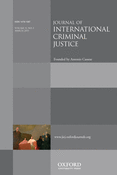-
Views
-
Cite
Cite
Chimène I. Keitner, Germany v. Italy and the Limits of Horizontal Enforcement: Some Reflections from a United States Perspective, Journal of International Criminal Justice, Volume 11, Issue 1, March 2013, Pages 167–183, https://doi.org/10.1093/jicj/mqs087
Close - Share Icon Share
Abstract
This contribution considers the implications of the decision of the International Court of Justice (ICJ) in Jurisdictional Immunities of the State (Germany v. Italy: Greece Intervening) for the evolution of structural norms relating to the immunity of foreign states in domestic courts, with a focus on the practice of the United States. It also considers whether the decision, which is explicitly limited to the question of state immunity, might nevertheless affect domestic courts’ willingness to recognize the immunity of officials who act on behalf of foreign states. It concludes that the state-centric nature of Germany’s challenge to Italy’s exercise of jurisdiction underscores the conceptual and doctrinal distinction between foreign state immunity, on the one hand, and foreign official immunity, on the other. This distinction is critical to legitimizing the horizontal enforcement of those substantive rules of international law that are binding on individuals and designed to protect other individuals from harms inflicted under colour of state authority.



